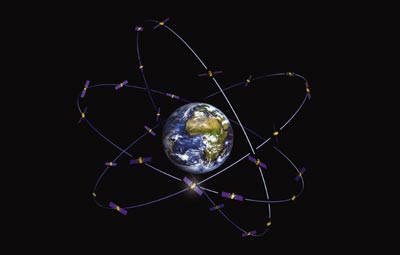Galileo: is the symbol stumbling?by Taylor Dinerman
|
| The case for Galileo, according to one French editorial, is purely military. |
If, however, as now seems obvious, it is to be a military system, then it will have to conform to military requirements, and one of these is that it can be turned off or degraded if it is found that the enemy is making use of the signal. Officially most European military organizations prefer to use the US system, which is fits in with NATO operational doctrine and over which they have some influence via the complex consultation structure of the Western alliance.
France has always looked upon Galileo as a military tool. They see it as one of the cornerstones of Europe’s future military space force. Lemaitre claims that, in private, Germany agrees with France. Britain stands in the way, but if the British were to pull out then they would lose their industrial role in the setup and would still be forced to pay for a share of the work through their mandatory payments to ESA and to the Common Agricultural Policy (CAP) fund, which has now been proposed to be tapped to pay for the system.
This last idea deserves to be examined a little more closely. The CAP has a surplus due to higher world grain prices. European farmers, for now at least, no longer need the generous subsidies that they had previously received. So now the surplus is available for Galileo. It cannot be used to help farmers in places like Poland or Romania, who need to upgrade their agricultural methods to make them more environmentally friendly—perhaps by introducing precision agricultural methods using GPS. (Oops, can’t use that!) Nor can the money be refunded to Europe’s taxpayers; bad precedent. So naturally it has to go into building military satellites.
Why should anyone be surprised? This was always a dreamlike project. The goal, according to Lemaitre, was to put an end to “American hegemony” to engage in the “conquest of space” and to enhance the “grandeur de l’Europe.” The Economist referred to it as a “political creation founded on national vanities.” A cursory reading of the French press would indicate that The Economist was spot on.
Galileo is often justified by saying that if the Russians and the Chinese have independent satellite navigation systems, why shouldn’t we? Well, the Russian system has been compared to the old Soviet-era Lada automobile, clunky and unreliable, but sometimes works better in the Arctic than Western models. The Chinese system is barely in existence, and it will probably be more than a decade before it has anything like the capabilities that GPS has now. Other nations, like India and Japan, which are just as jealous of their sovereignty as France is, have chosen to build augmented systems that use the GPS architecture as a base and add space and ground elements which match their own special local requirements.
In the September issue of GPS World, General James Armor, who just stepped down as head of the US National Security Space Office, proposed to “go a step further: I’d offer to let them build and operate GPS satellites for us if they would not build Galileo. They could add some of their own signals on the ones they build and launch too, if they wanted. They could run a backup ground station in Europe, and we’d run the whole thing as a joint constellation, perhaps through NATO. The US would still have enough autonomously owned satellites to guarantee our national security needs.” Also: “I think it would get us to a constellation that’s more than 40 or 50 satellites. There are a lot of benefits from doing that.”
The idea may seem a bit shocking, but before the European’s 2002 decision to build Galileo this was the direction that the GPS system was going, from a purely military system to a joint civil military system to, eventually, an international one. General Armor’s suggestion would merely restart a process that was already underway in 2002.
| It seems to come down to the fact that the European system is an expensive—in more ways than one—symbol of Europe as a global power. |
Finally, Lemaitre tries to claim that Galileo is not an anti-American program, and as evidence he cites the 2004 agreement on the frequency overlay issue, which was a humiliating climbdown for President Chirac. Few, if any, other Europeans wanted to follow France and turn the system into a major instrument of electronic warfare aimed at the US. He also says that some unnamed Americans see Galileo as a backup system in case GPS went down. The source for this probably is ignorant of the way the GPS system is structured: only an all-out hostile attack on the ground stations and on the satellites would significantly harm the US constellation. An enemy capable of that would be capable and motivated to hit Galileo as well.
It seems to come down to the fact that the European system is an expensive—in more ways than one—symbol of Europe as a global power. Scrapping the project and joining GPS might be humiliating for some former European leaders. The question, though, is why should today’s European governments pay for the delusions entertained by their predecessors?
